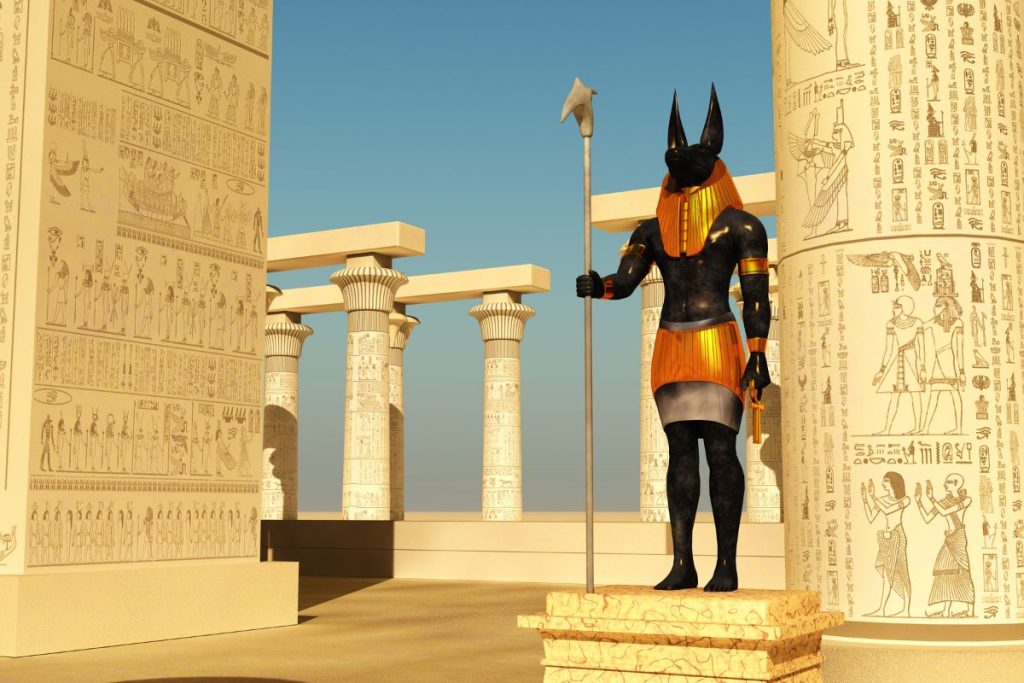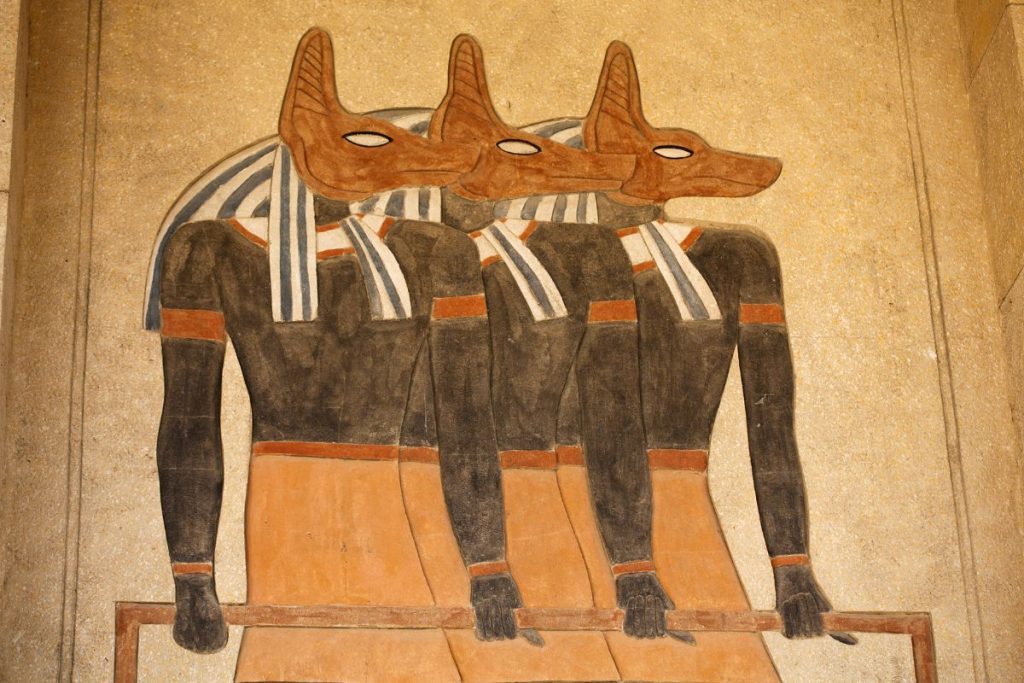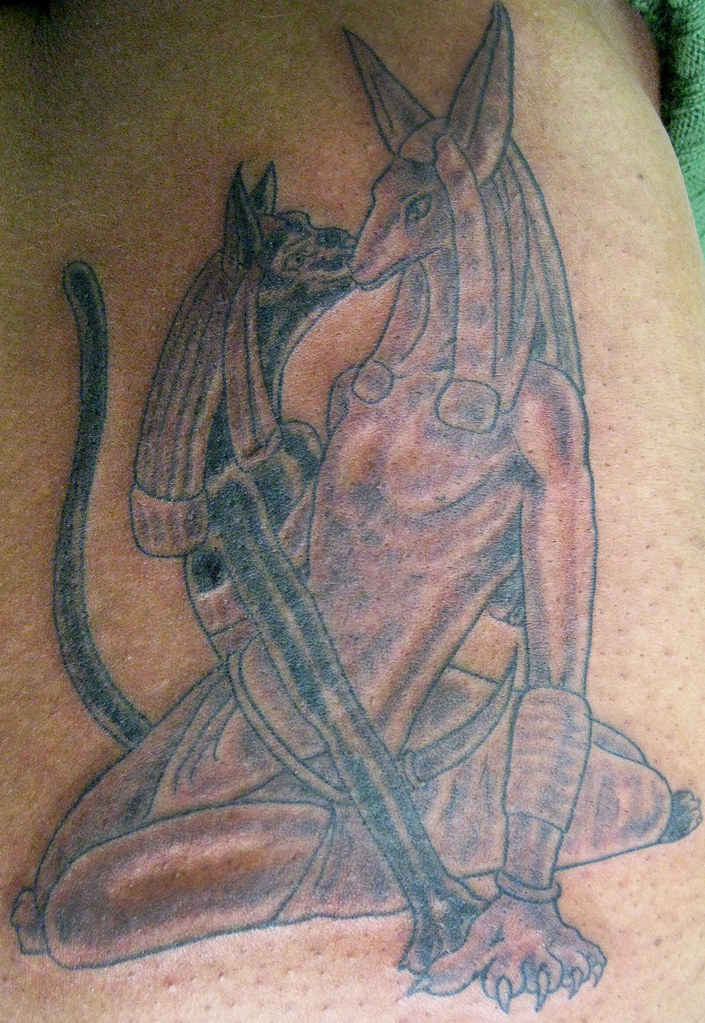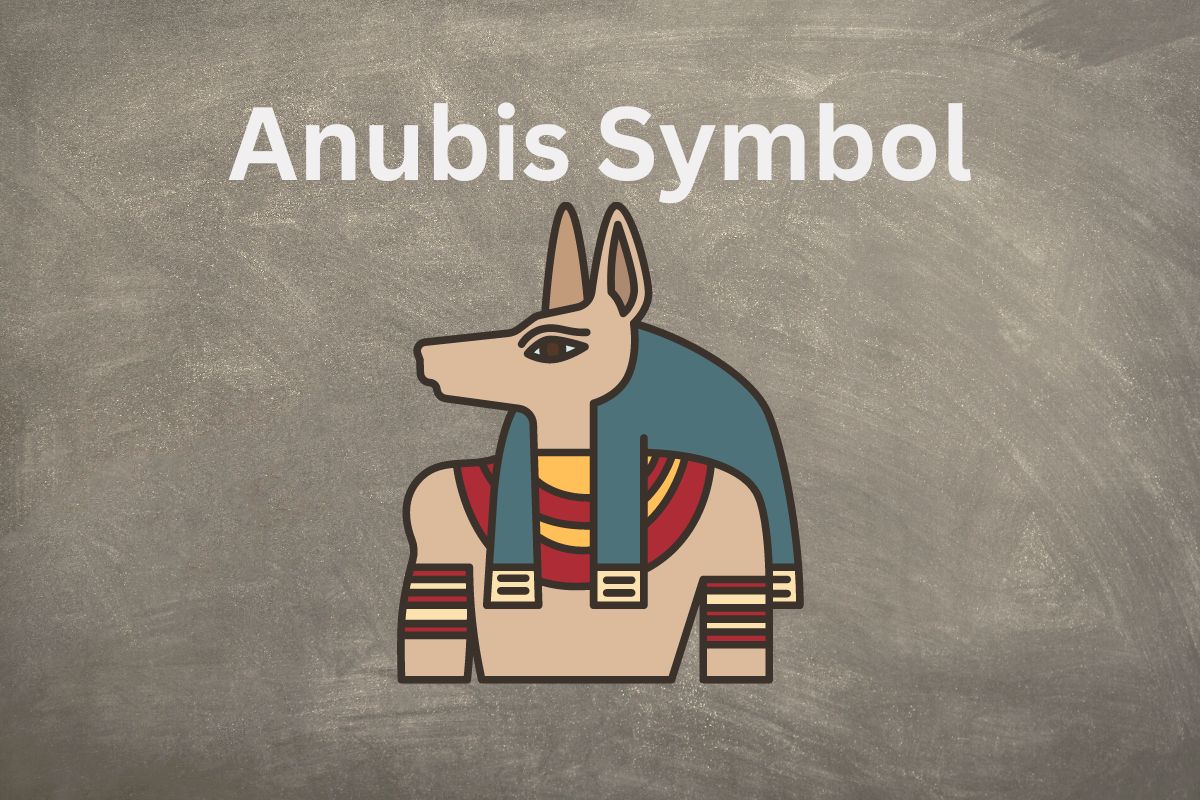Anubis is an ancient Egyptian god of the dead. He is the god of mummification and is depicted with the head of a jackal. The scepter with a cross topped by an oval design also represents Anubis. He's the power, domination, and protection. He guards the cemeteries and burial chambers and guides the dead through the underworld.
Anubis Symbol History and Meaning
Anubis has a black body, symbolizing decay and the color of the Nile’s soil. He is adorned with leopard skin and gold jewelry.
Anubis is one of the oldest gods. He is mentioned in Egyptian and Greek mythology. Ancient Egyptians worshiped Anubis (a jackal-headed god). His symbol is the Ankh (key of life).
According to the ancient Egyptian religion, Anubis is the son of Osiris, the Lord of the Underworld. His mother is Nephthys, a friend of the dead. Bata and Horus are his siblings. Isis is his adopted mother and aunt (Nephthys and Isis were twin sisters).
The jackal god was first mentioned in the Pyramid Texts of Ancient Egypt. Historians say that the Anubis legend was developed during the Predynastic period (6000-3150 BC).
Anubis is a Greek word, but he’s known as Anpu or Inpu in Egyptian. The words loosely translate to royal child and decay.
This confirms that Anubis is related to royalty and deals with the dead (embalming, mummification, performing last rites, etc.).

Was Anubis Good or Evil?
Though Anubis is associated with death, he’s not considered evil. Anubis has the responsibility to keep evil out of Egypt. He also has the responsibility of protecting the graves and guarding cemeteries. He’s a good god.
What Is Anubis’s Real Name?
Anubis has many names, like Anpu and Inpu. He is also called Imyut (an embalmer). He judges souls by weighing their hearts. He determines who can go into the afterlife and guides the souls in the underworld. The heart is considered to be the container of human emotions and intellect.
Anubis uses a golden scale and a white feather to weigh the heart. A pure heart will be lighter than a feather. The dead soul is sent to the Field of Reeds. Ammit, the goddess of retribution, will devour a heavy heart, and the dead person faces punishment for the crimes committed when alive.
What Is Anubis’s Secret Name?
Anubis also has the following titles:
- Lord of the Sacred Land
- Ruler of the Nine Bows
- Master of Secrets
- Foremost of the Divine Booth (Khenty-seh-netjer)
- He Who is Upon His Sacred Mountain (Tepy-djouf )
- The Dog Who Swallows Millions
- He Who is in the Place of Embalming (Imy-out)
- Lord of the Necropolis (Neb-ta-djeser)
All the titles indicate his various roles and responsibilities as the god of the dead, embalming, and mummification.

Who Killed Anubis?
Anubis’s role changed when Osiris was made the god of the underworld (after restoration). Anubis continued to perform his responsibilities and took up a new role as the protector of tombs. Some legends say Anubis was his father’s shadow, protecting him and the tombs.
What Does Anubis’s Left Hand Hold?
Anubis holds an ankh in his left hand, which is the symbol of life. Anubis knows the secrets to life after death, symbolized by the ankh. He holds a scepter, or staff, in his right hand. In some works, Anubis also has the golden scale to weigh hearts and determine the course of a soul in the afterlife.
What Is Anubis’s Special Power?
Anubis is one of the most powerful gods in Egyptian mythology. He performs the old and sacred Opening of the Mouth Ceremony while embalming a dead body. Anubis invented the embalming process by performing it on Osiris when Seth attacked him.
His special powers are guarding tombs, weighing hearts, and guiding souls in the afterlife. He is strong, fast, and fierce in protecting the dead.
Who is Anput?
Anubis is male, but Anput is female. She is his wife and represents the personification of the seventeenth nome of Upper Egypt. The name Anput is an edited version of Anubis.
Who is Kebechet?
Kebechet (Qebehet), the goddess of purification, is the daughter of Anput and Anubis. Kebechet assists Anubis by cooling down souls with water and purifying them for the next stage in the afterlife.
How to Write the Anubis Symbol in Egyptian
Anubis is written as Ἄνουβις in ancient Greek. In Egyptian hieroglyphs, Anubis is depicted as a black jackal on a mountain/shrine. He is in a sitting/crouching position with the paws at the front and his head looking straight.
Anubis is depicted as a jackal and a human with a jackal head in Egyptian art.
What Does Anubis Tattoo Symbolize?
Anubis tattoos sometimes resemble ancient artwork. However, the tattoos symbolize power and protection. They are also associated with helpfulness. For some people, the Anubis tattoo is a reminder that life is worth living.
The tattoos come in several forms. A few have only the jackal head, and some have the full-body representation of the god of the dead. Depending on the features of the jackal, the tattoo can also mean judgment and control.

Anubis in Popular Culture
The Egyptian god Anubis became a popular character in modern times. He was given more powers and made fearful of increasing the entertainment value. Today, we can see Anubis in comics, video games, books, movies, retellings, etc. The 20th century Anubis was turned into a sinister deity with evil traits for commercial purposes.
What is the Evil Eye in Egypt?
Egypt’s evil eye is Horus’s eye, used to protect people from evil intentions and energy. Horus sacrifices his eye to bring his father (Osiris) back to life when Seth kills him. His eye symbolizes protection from evil and healing.
Anubis had a vital role in ancient Egypt. He symbolizes power, judgment, the afterlife, and protection from evil. Many priests (with masks) and citizens worshipped Anubis in the older days. He protects and guides people’s souls in the underworld. The Book of the Dead has details of Anubis’s role.
If you’ve found this article helpful, check out this post on the meaning of the nazar.

